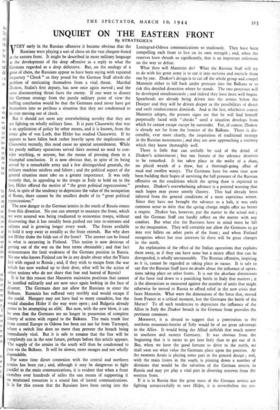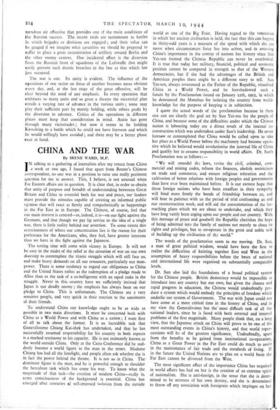UNQUIET ON THE EASTERN FRONT
By STRATEGICUS
as en we pn-
cy tor les No ye iId
in he tic
Ity ed an ed it-
'es
as tal as
ity n-
Dn he as ee ne 5.
ns r‘ri
Cr
flu
)e
11 in 5-
But it should not seem any overwhelming novelty that they are not fighting on wholly military lines. It is pure Clausewitz that war is an application of policy by other means, and it is known, from the ironic gibe of von Leeb, that Hitler has studied Clausewitz. If he appears to have fallen back rather heavily upon the implications of Clausewitz recently, this need cause no special astonishment. While the purely military operations served there seemed no need to con- sider anything, or anyone, but the means of pressing them to a triumphal conclusion. It is now obvious that, in spite of its being served by a remarkable army and a few distinguished generals, the military machine misfires and falters ; and the political aspect of the general situation must take on a greater importance. It was only recently that, in appealing to the troops in Italy to hold on to the last, Hitler offered the motive of "the great political repercussions." And, in spite of the tendency to depreciate the value of the occupation of Rome, there cannot be the smallest doubt of its "great political repercussions."
The new danger to the German armies in the south of Russia comes from this direction. No one can attempt to measure the front, which we were assured was being readjusted to economise troops, without discovering that it has steadily been pushed out into re-entrants and salients and is growing longer every week. The forces available to hold it seep away as steadily as the front extends. But why does not Hitler shake the folds out of the front? The answer can be found in what is occurring in Finland. This nation is now desirous of getting out of the war on the best terms obtainable ; and that fact demonstrates the fatal weakness of the German position in Russia. No one who knows Finland can be in any doubt about what theFinns feel with regard to Russia ; and, if they wish to escape from the war which has now washed up to their door, what will be the action of other nations who do not share that fear and hatred of Russia?
It is for this reason that Manstein maintains positions that cannot be justified militarily and are now once again looking in the face of disaster. The Germans dare not allow the Russians to enter the Balkans. Rumania has suffered very terribly and would escape if she could. Hungary may not have had so many casualties, but she would abandon Hitler if the way were open ; and Bulgaria already
seems to be attempting an alibi: But now, with the new blow, it can be seen that the Germans are no longer in possession of complete liberty of action with regard to the Balkans. The main trunk line from central Europe to Odessa has been cut not far from Tarnopol, where a switch line does no more than prevent the breach being immediately vital. But it is safe to assume that the line will be completely cut in the near future, perhaps before this article appears. The supply of the armies in the south will then be condemned to Pass via the Balkans. It will be slower, more meagre and not wholly dependable.
For some time direct connexion with the central and northern
armies has been .cut ; and, although it may be dangerous to fight parallel to the main communications, it is evident that when a front stretches over hundreds of miles the one means of supporting it on straitened resources is a sound line of lateral communications. It is for this reason that the Russians have been eating into the
Leningrad-Odessa communications so studiously. They have been compelling each front to live on its own strength ; and, when the reserves have shrunk so significantly, that is an important milestone on the way to defeat.
What then will Manstein do? What the Russian Staff will try to do with his great army is to cut it into sections and encircle them one by one. Zhukov's design is to cut off the whole group and compel Manstein either to fall back under pressure into the Balkans or to risk this detailed dissection where he stands. The two processes will be developed simultaneously ; and indeed they have been well begun. Spearheads are already being driven into the armies below the Dnieper and they will be driven deeper as the possibilities of direct and swift reinforcement diminish. And at the last, whichever course Manstein adopts, the present signs are that he will find himself perpetually faced with " checks " until a situation develops from which he cannot escape except by surrender. For, of course, Zhukov is already not far from the frontier of the Balkans. There is dis- cernible, ever more clearly, the inspiration of traditional strategy in the Russian movements ; and they are now approaching a territory which they know thoroughly well.
There is little that can usefully be said of the detail of Zhukov's achievement ; but one feature of the advance deserves to be remarked. It has taken place in the midst of a Maw, no placid wraith of a thaw, but a thorough-going affair of mud and swollen waters. The Germans have for some time now been building their hopes of surviving the full pressure of the Russian offensive on the conditions which the spring thaw is expected to produce. Zhukov's overwhelming advance is a pointed warning that such hopes may prove utterly illusory. This had already been inferred from the general conditions of a most capricious winter. Since they have not brought the advance to a halt, it was only common sense to infer that the spring change might offer no better a respite. Zhukov has, however, put the matter to the actual test ; and the German Staff can hardly reflect on the matter with any comfort. But what else the Russians have in mind must be left to the imagination. They will certainly not allow the Germans to go into rest billets on other parts of the front ; and when Finland recognises where her true interests lie there will be great changes in the north.
An explanation of the effect of the Italian operations that explains them away, as if they can have none but a minor effect that can be disregarded, is wholly unreasonable. The Russian offensive, inspiring as it is, cannot be regarded as taking place in vacuo. It is safe to say that the Russian Staff have no doubt about the influence of opera- tions taking place on other fronts. It is not the absolute dimensions of the force tied down to a punishing battle in Italy that matters ; it is the dimensions as measured against the number of units that might otherwise be moved to Russia to afford relief in the new crisis that faces Manstein. What were the dimensions of the force that, moved from France at a critical moment, lost the Germans the battle of the Marne? To all such tendencies to depreciate the influence of the Allies in Italy the Zhukov breach in the German front provides the pertinent comment.
Moreover, it is absurd to suggest that a penetration to the northern mountain-barrier of Italy would be of no great advantage to the Allies. It would bring the Allied airfields that much nearer to southern and eastern Germany. It was obvious from the beginning that it is easier to get into Italy than to get out of it. But, when we have the good fortune to drive to the north, we shall soon see what value the Germans place upon the position. At the moment Anzio is playing some part in the general design ; and, with the main fronts in the south, is pinning down a number of divisions that would be the salvation of the German armies in Russia and may yet play a vital part in diverting reserves from the western front_ If it is in Russia that the great mass of the German armies are fighting unsuccessfully to save Hitler, it is nevertheless the tre- mendous air offensive that provides one of the main conditions of the Russian success. The recent raids are tantamount to battles in which brigades or divisions are engaged ; and their value can be gauged if we imagine what casualties we should be prepared to suffer to place a great concentration of artillery around Berlin and the other enemy centres. One incidental effect is the diversion from the Russian front of squadrons of the Luftwaffe that might easily prevent such drastic breaches in the line as that which has just occurred.
The war is one. Its unity is evident. The influence of the operations of one sector on those of another becomes more obvious every day, and, at the last stage of the great offensive, will be clear beyond the need of any emphasis. In every operation that embraces so many units and so great a theatre the successful plan entails a varying rate of advance in the various units ; some may play their sufficient part by merely holding, while others profit by the diversion to advance. Critics of the operations in different places must keep that consideration in mind. Anzio has gone through many vicissitudes ; but now it seems to be holding Ktsselring to a battle which he could not have foreseen and which he would willingly have avoided ; and there may be a better phase near at hand.



























 Previous page
Previous page